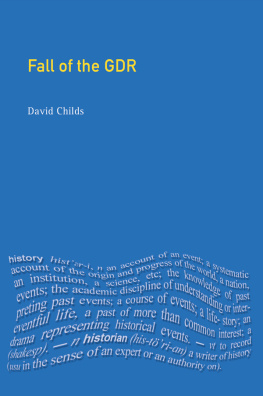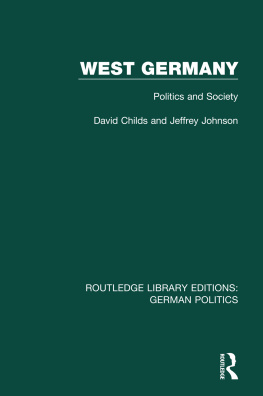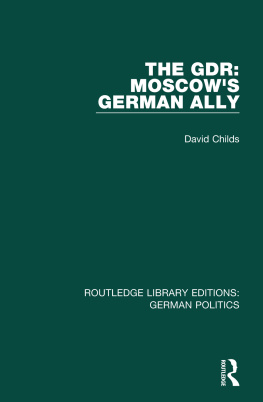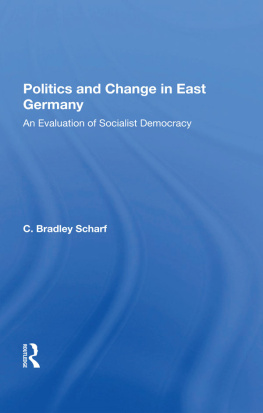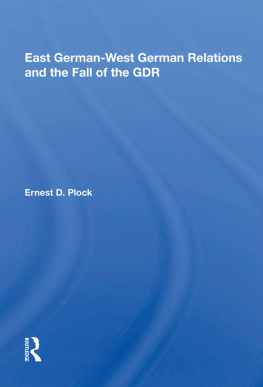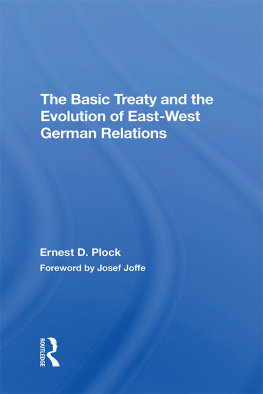ROUTLEDGE LIBRARY EDITIONS: GERMAN POLITICS
Volume 4
HONECKER'S GERMANY
Honecker's Germany
Edited by
David Childs
First published in 1985
This edition first published in 2015
by Routledge
2 Park Square, Milton Park, Abingdon, Oxon, OX14 4RN
and by Routledge
711 Third Avenue, New York, NY 10017
Routledge is an imprint of the Taylor & Francis Group, an informa business
1985 David Childs
All rights reserved. No part of this book may be reprinted or reproduced or utilised in any form or by any electronic, mechanical, or other means, now known or hereafter invented, including photocopying and recording, or in any information storage or retrieval system, without permission in writing from the publishers.
Trademark notice : Product or corporate names may be trademarks or registered trademarks, and are used only for identification and explanation without intent to infringe.
British Library Cataloguing in Publication Data
A catalogue record for this book is available from the British Library
ISBN: 978-1-138-83837-6 (Set)
eISBN: 978-1-315-72630-4 (Set)
ISBN: 978-1-138-84610-4 (Volume 4)
eISBN: 978-1-315-72758-5 (Volume 4)
Publisher's Note
The publisher has gone to great lengths to ensure the quality of this reprint but points out that some imperfections in the original copies may be apparent.
Disclaimer
The publisher has made every effort to trace copyright holders and would welcome correspondence from those they have been unable to trace.
Honecker's Germany
Edited by
David Childs
University of Nottingham
London
ALLEN & UNWIN
Boston Sydney
David Childs, 1985
This book is copyright under the Berne Convention.
No reproduction without permission. All rights reserved.
Allen & Unwin (Publishers) Ltd,
40 Museum Street, London WC1A 1LU, UK
Allen & Unwin (Publishers) Ltd,
Park Lane, Hemel Hempstead, Herts HP2 4TE, UK
Allen & Unwin, Inc.,
8 Winchester Place, Winchester, Mass. 01890, USA
Allen & Unwin (Australia) Ltd,
8 Napier Street, North Sydney, NSW 2060, Australia
First published in 1985
British Library Cataloguing in Publication Data
Honecker's Germany.
Germany (East) - Social conditions
I. Childs, David
943.1087'8
HN460.5.A8
ISBN 0-04-354031-7
Library of Congress Cataloging in Publication Data
Honecker's Germany.
Bibliography: p. 188
Includes indexes.
1. Germany (East) - Addresses, essays, lectures.
2. Honecker, Erich - Addresses, essays, lectures.
I. Childs, David, 1933
DD287.H66 1985 943.1 85-9064
ISBN 0-04-354031-7 (alk. paper)
Set in 10 on 11 point Times by Ann Buchan (Typesetters), Walton-on-Thames, Surrey and printed in Great Britain by
Billing and Sons Ltd, London and Worcester
Contents
| by David Childs |
| by David Childs |
| by Hermann Weber |
| by Inge Christopher |
| by Stephen F. Frowen |
| by John Page |
| by Roland Smith |
| by Roger Woods |
| by J. H. Reid |
| by David Childs |
| by Dale R. Herspring |
| by Martin McCauley |
| by David Childs |
The administrative regions of the GDR
It was decided to call this book Honecker's Germany because it concentrates on the GDR since 1971. Some contributors have, however, felt obliged to say something about the period before that date as well. This matters little as right from the start Honecker played a key role in the SED's efforts to create a socialist state between the Elbe and the Oder, first as head of the Free German Youth, 1946-55, and then in the higher councils of the party itself. Finally, from 1971 Erich Honecker has served as first/general secretary of the SED and from 1976 as head of state as well.
This collection of essays attempts to deal, in the main, either with topics not covered in my earlier The GDR: Moscow's German Ally, or with topics which could not be discussed at length. This is particularly true of the chapters on the churches, youth, Christa Wolf and Irmtraud Morgner, the GDR Navy, GDR relations with the USSR, and, even more, GDR relations with the USA. As for the other chapters, they deal with subjects important enough to merit further discussion from a different perspective from the one I originally chose. I hope that, in some small measure, the new book will do justice to the growing body of research on the GDR being undertaken in Britain and North America. Our only contributor who is not working in an English-speaking state is Professor Hermann Weber. Herr Weber has spent virtually the whole of his adult life researching German communism, the SED and the GDR. At some time or other we have all made use of his publications. I would like to take this opportunity to thank him, and his colleagues, for arranging the first Anglo-West German study conference on the GDR at the University of Mannheim in September 1984. The discussions at the ninth annual conference of the Association for the Study of German Politics, with Hermann Weber, led to both the conference and the book.
I would like to thank Tony Millson and Roland Smith of the British Military Government, Berlin, and Tim and Josiane Evernard and the staff of the British Embassy (GDR) for their hospitality during my visit in 1984. I should also like to thank Brian Quigley and Greg Sandford of the US Embassy to the GDR for giving me their impressions of US-GDR relations, and Stefan Heym for receiving me into his home.
Readers should note that 'billion' follows American, not German, usage throughout, that is it denotes 1,000 millions. Finally, I must emphasize that the views expressed in this book are those of the individual authors alone.
David Childs,
University of Nottingham,
May 1985
DAVID CHILDS
The last decade and a half has been an exciting one for the foreign-policy-making elite of the German Democratic Republic (GDR). In 1969 the GDR, despite its economic, educational and military development, was almost totally isolated diplomatically. It was desperately happy to receive a few backbench parliamentarians from anywhere west of the Elbe. To a considerable extent it was the abandonment of the Hallstein doctrine by Bonn, its diplomatic sanctions against any state outside the Soviet bloc taking up relations with the GDR, which paved the way for the worldwide recognition of Honecker's German state in the 1970s. No one can accuse the GDR's leaders of failing to take full advantage of the new situation. They had a ticket to ride and they rode! Since then they have shown no tendency to develop travel sickness or jet lag! Erich Honecker is an enthusiastic traveller and he sets the tone. The fact that the GDR's most crucial relations are with Bonn and, above all, with the USSR, has obscured its relations with the rest of the world. With Bonn, relations, despite ups and down, have been far better than most Western commentators and politicians would have believed possible in 1969. More surprisingly, the change of government in Bonn in 1982, from a left of centre to a right of centre coalition, has led to no worsening of relations between the two German states. Any serious West German politician, whatever his party, feels obliged to visit the GDR. This mirrors public concern about the maintenance of close relations with the other half of Germany. Equally, the politicians of the GDR know that they must strive for better relations with Bonn because of the expectations of their people. It seems that the process of inter-German dtente, resulting from the Ostpolitik pursued since 1969, has taken on a momentum of its own which the politicians could not resist even if they wanted to. The credits from Bonn negotiated by the GDR in 1983 and 1984 will give further momentum to this process because they help to secure the human ties between the citizens of the two states. The DM 1 billion (270 million) credit West German banks granted the GDR in summer 1983 led to the GDR lifting the minimum exchange requirement demanded from children visiting from the West. The DM 950 million (257 million) credit announced in July 1984 led to a reduction of the minimum exchange requirement for pensioners from the West visiting the GDR, and some other concessions. After falling for several years from the 3,124,000 peak in 1975 visits by West Germans to the GDR have risen since 1981:



